How to Network at a Conference
This post may contain affiliate links and Corporette® may earn commissions for purchases made through links in this post. As an Amazon Associate, I earn from qualifying purchases.
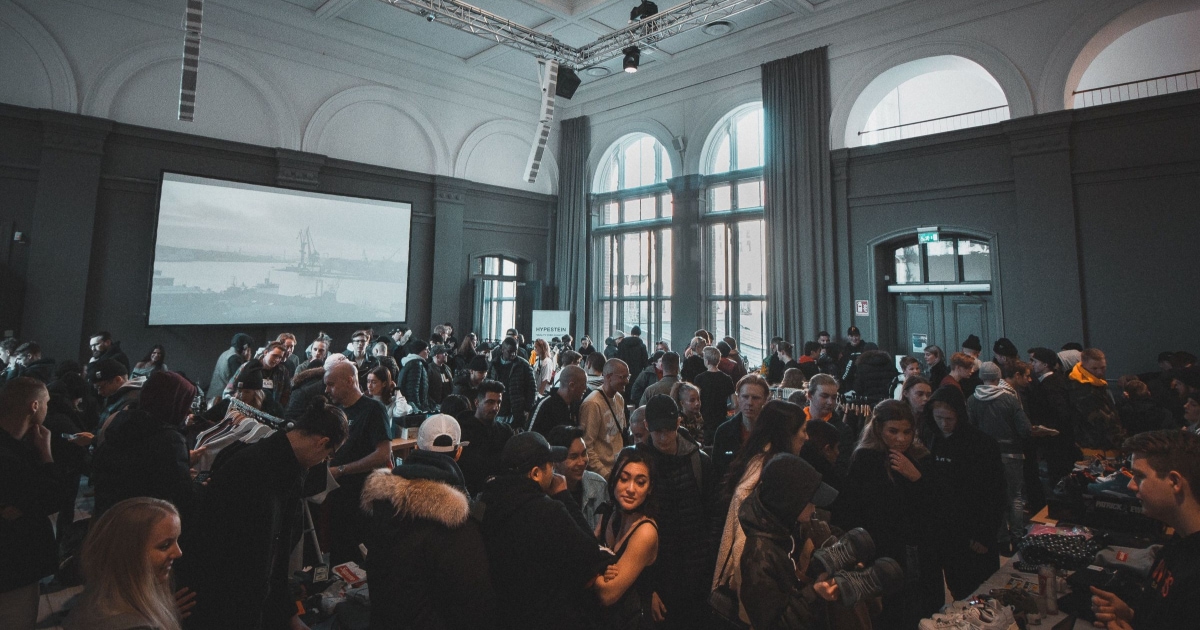
How do you network at a conference where you know no one? Reader A wonders…
I've been a lawyer for about one year, and I'm going to my first national conference in a couple of months. I'm the only person from my firm going, and I don't anticipate knowing anyone there. Do you have any tips for networking, meeting people, and generally getting a lot out of a conference when one is attending completely alone?
Yowza — that can be difficult, and I'm curious to hear what the readers say. Here are a few of my own suggestions…
We’ve also discussed how to network when you're junior, how to build a network and maintain it, how to know which networking organizations to join, alumni mentoring and networking, how to get networking help from an adjunct professor, and networking in your niche — but outside your company. We've talked about what to wear to a business casual networking event and a recruiting dinner, as well as how to network with both older men and older women.
How to Network at a Conference
– Make a “wishlist” based on who you KNOW will be attending. If this is a really huge conference, you might only know the speakers who are attending or the organizers, but look over their LinkedIn or other online profiles and see if any of them will be your “dream” connection.
Even if speakers don't stay for the other conference sessions, you can usually catch them after their own sessions, or possibly at cocktail hours.
You can also look at the conference organizers — either the organizations/entities who have arranged the conference, or if the actual organizing committee is listed, take a look at the list of names there.
A third option for big conferences: look at the sponsors of the conference; they'll usually have at least one or two people in attendance, and they'll usually be easy to find (for instance, they'll have a conference table).
– Ask people in your organization who have attended the conference before, and ask if there are any characters that you should meet, or other suggestions, such as which events you should make a point of attending.
These are some of the Corporette readers' favorite items for business travel…
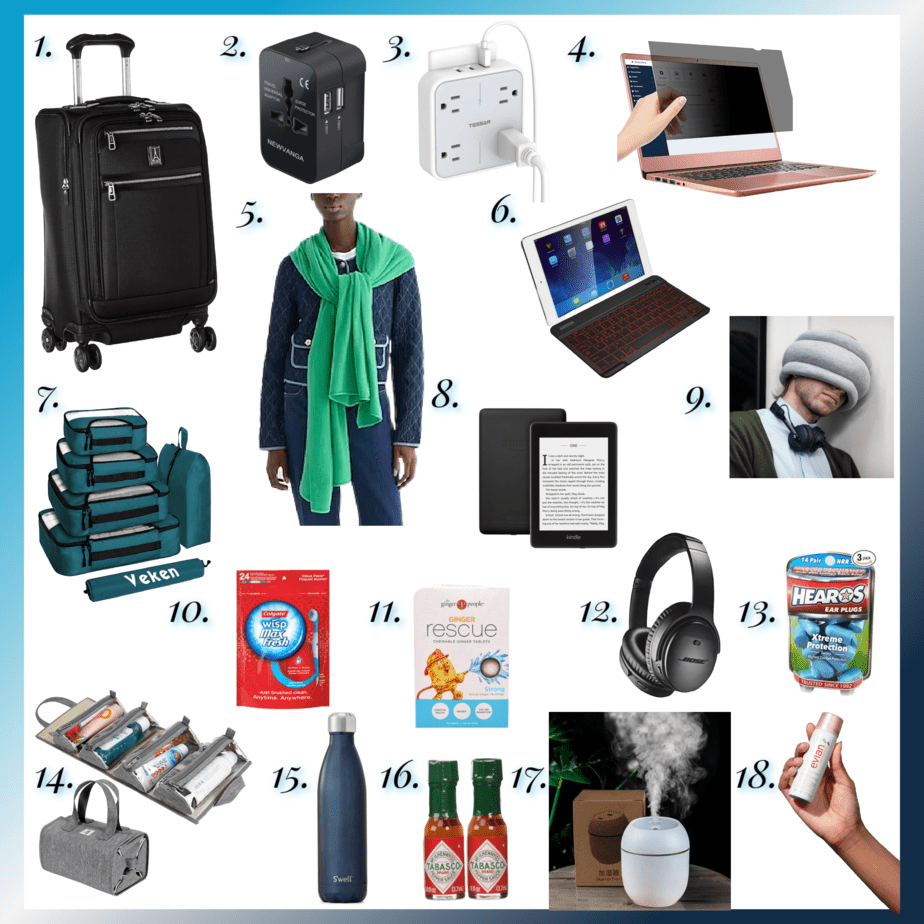
– Consider posting a status update on Facebook or Linked In that you're looking forward to attending the conference. If friends are attending, or know other people who are attending, you might be able to work your own network. If you're a member of a small enough group on Linked In, or a specialized alumni listserve, consider posing a question to that smaller group.
– At the conference, you may receive a list of attendees. If so, look for names you recognize in your field. Another idea: look for other people from your city. (For example, if you're an Alabama lawyer attending a conference in Florida, look for other lawyers from Alabama firms or Alabama offices.)
– Tweet. Yes, seriously — if you haven't joined Twitter yet in a professional capacity, consider joining for the conference. Many conference organizers are even giving out hashtags just for conferences now, and it can be a great way to have a conversation and highlight points of interest in realtime — sometimes panelists even take questions via Twitter. Depending on what field you're in, there may be only a few Tweeting (such as at the last law conference I went to), and you'll definitely stand out. You can even attach a recent professional picture to your Twitter handle so people can find you during the next snack break. (Oh: and then you can follow Corporette on Twitter!)
– Finally: Talk to everyone. In line for the ladies room? Say hello. In line for a cup of coffee? Say hello. Someone kind of look familiar from another conference or work event? Go over and say hello. If you can, change your seat at least twice a day, and introduce yourself to the people on both sides of you.
Readers, what are your tips for meeting people at conferences? Do you have any great networking tips when you know no one?
Some of the best work bags for women as of 2025 include great totes from Cuyana (with a zipper), Tumi, Tory Burch, Lo & Sons, and Madewell (north/south). Also try this highly-rated organizing insert from OMYSTYLE or these clever pouches with some of the less structured bags! If you're looking for a budget tote (or one in a specific color) check this faux leather tote from Amazon (22K+ good reviews) or this nylon tote at Amazon (60K+ good reviews).
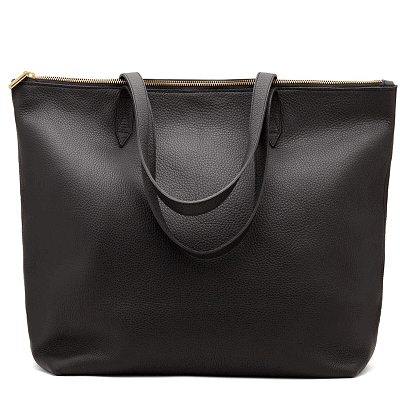
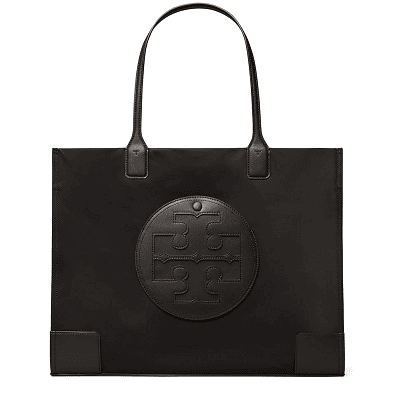
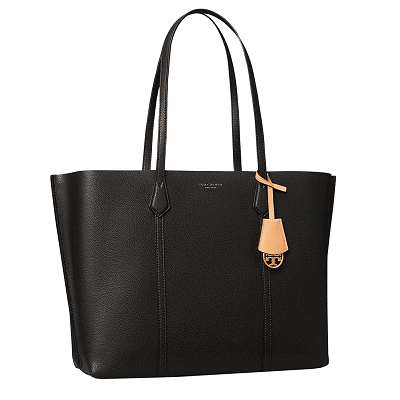
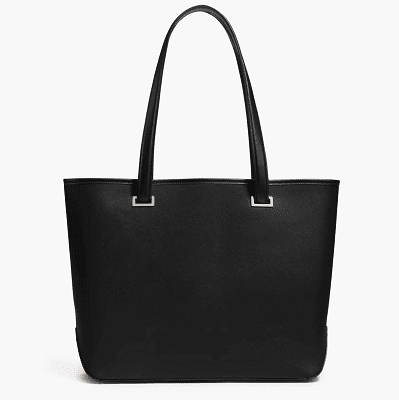
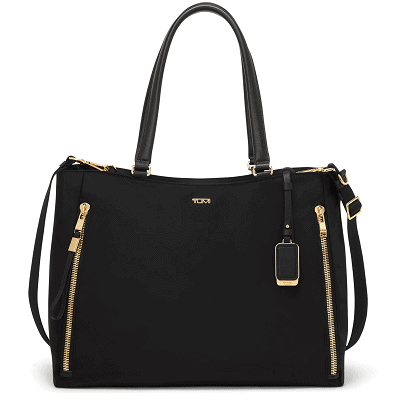
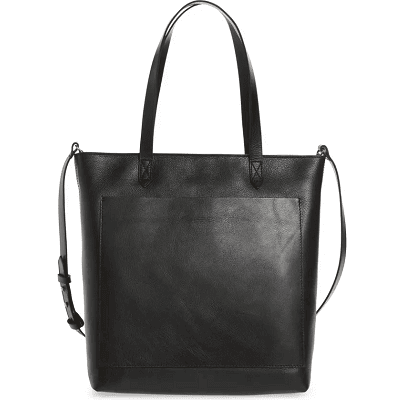
(Looking for a luxury work bag? Here's our latest roundup…)
What to Wear to Conferences
Work Dresses with Pockets
As long as tights or hose aren't a question, work dresses with pockets can be a great thing to wear…
As of 2025, some of the best work dresses with pockets include M.M.LaFleur, J.Crew, Lands' End, Elie Tahari, and Boden… Some of our latest favorites are below! If you're on a budget, Quince has a great basic, this business casual Amazon dress has pockets, and Amazon seller VFShow has a number of dresses with pockets! Both Amazon and Etsy make it pretty easy to find dresses with pockets, as well.
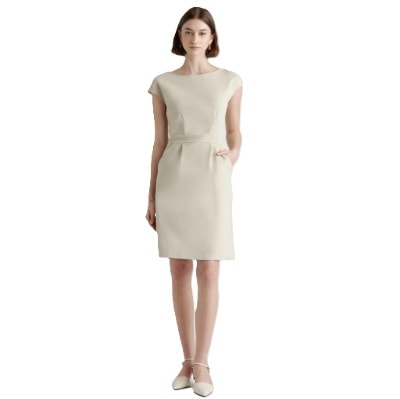
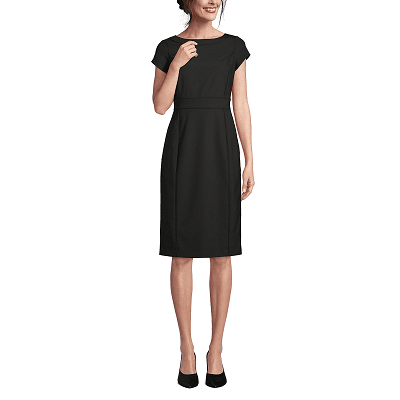
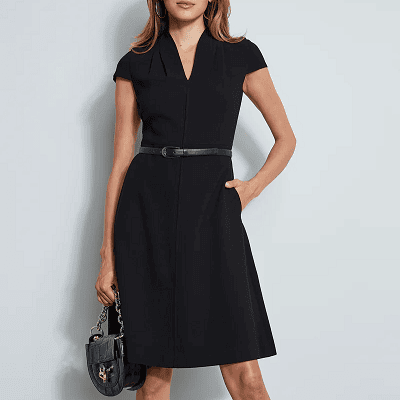
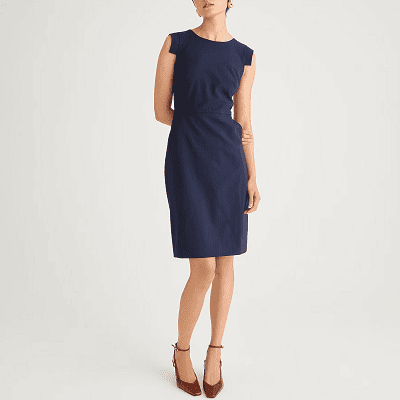
Foldable Flats
These can be lifesavers if your limited shoe options are killing you! They also work great as hotel slippers.
Some of our favorite foldable flats as of 2025 include Silky Toes, Yosi Samra (at Amazon and Nordstrom), and Amazon seller HEAWISH. If you're looking to splurge, the Tory Burch travel flat also has a split sole.
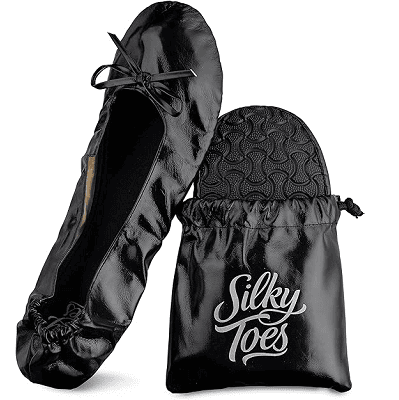
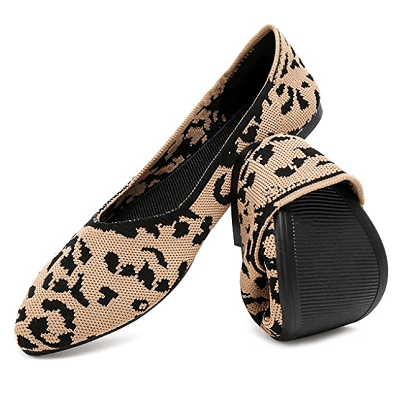
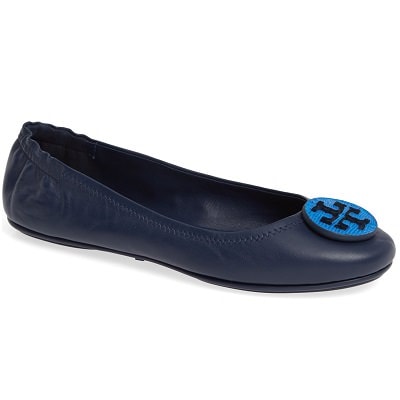
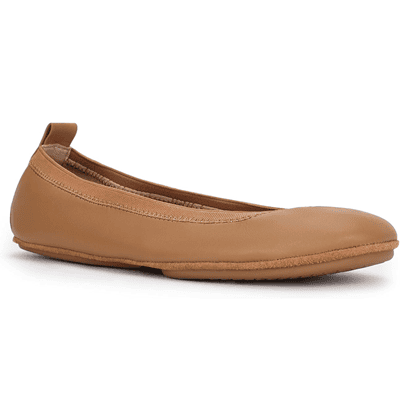
(2020 updated images (dark conference shot) via Stencil. Originally pictured: Conference, uploaded to Flickr by zigazou76.)

It’s easy to start conversations right after a panel or talk by asking your neighbor what they thought about it. I also love the idea of Tweeting… I do this at conferences and find new people whose views I like – it’s a great conversation starter
Agreed that striking up a conversation with people you sit by is a good place to start. (And yes, I am an introvert.) I actually pick my seat very purposefully at these things, sitting near people who are also alone. Lots of people go to law conferences alone, and I find that people are usually happy to be joined, whether it’s at a table during a meal/reception or in an otherwise empty row.
Agreed- before and after sessions are great for discussing what you just experienced. I also try to talk to at least one or two presenters. One tricky thing for me is morning networking, before the sessions begin. I find grabbing a cup of coffee has more than once led to conversations, such as if there’s a line for the espresso machine, but just a few people at the “regular” coffee machine, I head to the shorter line and see what happens. I also like to, when I have the option, volunteer at a conference (or present!). Either way, you get a chance to greet people and be “on” while volunteering, and people often remember you later in the day if you helped them earlier. A bolder approach, which I tried at a small conference, was to ask to share a table with another single diner from the conference at a busy restaurant. Sharing got us a table faster, and good conversation.
coffee line, great idea! I am going to try that next time
If you have an attendee list, go straight to LinkedIn and look everyone up. If you have second or third degree connections with attendees, consider asking for an introduction to those who look interesting. Or if you’re brave, send an intro message an ask to connect.
Headed to a conference in a few weeks (AHLA Fraud & Compliance in Baltimore anyone?) and very interested in replies here.
Trans-Issues Threadjack. I have a friend who I was super close to about 10 years ago (already!) and stay in touch with via facebook. She recently posted somethings that suggest that she might be transitioning to the male gender (sorry if I get the vocabulary wrong here).
She first posted a picture of herself with a new haircut and a vague comment about her hair “reflecting [my] gender”. She did have a pixie so I figured that maybe she didn’t like her old cut so she got a new stylist?
Since I’ve known her, she hasn’t ever been interested in clothing (works on a college campus and is into nature-type hobbies). Over the past week, she’s been posting daily pictures of herself in beautiful mens suits and ties. They are really nicely tailored and the colors are beautiful. She doesn’t include any comments or captions. She is active in the LBGT community but none of her friends are posting comments on the suits (there were 40 likes and 10 comments on her hair, though).
I don’t know if she’s transitioning and I don’t want to force the issue. I find it odd that there aren’t comments on her beautiful new threads from her and if others were commenting, I’d feel more comfortable cheering her on. I think it’s better to treat this (whatever this is) like a pregnancy (where I pretend not to notice until she’s ready to announce it) instead of a mental health crisis (where I would confront her my suspicions). Bottom line is, I want to be supportive of her.
So how do I be supportive in this situation without being nosy?
Maybe I’m not seeing the issue, but I don’t see a problem with commenting on her clothing (i.e., “gorgeous suit,” “love the tie”). You don’t have to make the comment transition/gender specific.
Perhaps she wasn’t interested in clothing before because she wasn’t interested in women’s clothes.
Thanks! Should I send a compliment as a private message? The lack of captions and comments from her LGBT and Ally colleagues is really confusing to me.
I think that if it is a basic compliment that doesn’t touch on anything too personal (again, “love the suit!” type stuff), a comment is fine. If the comment starts to veer into more personal territory (“I noticed you mentioned something about transitioning to the male gender, and wanted to let you know that I think you look great in all of your recent photos!” <– please note I have no idea if this is the "correct" way to say this), then a private message is more appropriate.
I think either way, compliments on snazzy dressing would be appreciated. You can also take a look and see if theyve changed their gender on Facebook–does it still say “Ann changed her profile pic!”? But really, I think unless the person comments on it there’s no need. If you’re seeing them in person, you could certainly ask what name/preferred gender pronoun they use, but I think if just on fb shouldn’t be hard.
No change in gender or name. Thanks! I think a gender-neutral comment on snazzy dressing would be the most appropriate–I guess I do think in a very gendered way about people.
What about a simple “nice outfit, you look really sharp!” Maybe she’s transitioning, maybe she’s genderqueer (somewhere between male and female in terms of identity or self presentations), maybe she’s not sure yet. I think in this case you just have to follow her lead, be enthusiastic for things that she’s showing enthusiasm for (like the new haircut and outfits) and absolutely respect any more overt changes that she makes (like requesting to be called by a male pronoun or changing her name).
I had a similar situation when an old and not particularly close friend of mine started changing her facebook name, first to gender neutral and then to masculine names. I sort of just watched it happen and interacted like I always had, but when I needed to e-mail her about something unrelated, I inserted a sentence being like “hey, notice your name is X on facebook now. Is that what you prefer me to call you?” and then continued to the meat of the message. She responded with pages about her process and where she thought it was and how much agonizing she had done about asking people to call her a different name (and use a different pronoun… she didn’t view herself as a man or woman). She had obviously thought a lot about how people would respond, but apparently wasn’t inclined to reach out to me and ask me to refer to her as something different. So, now I refer to her with her new name and all is well.
So I guess I would not go out of my way to point anything out, continue commenting or liking photos or whatever you did on her facebook before, but feel free to address it in an organic way if it comes up.
I agree with the recommendation to compliment her hair, or pictures of her dogs, or whatever else you might have complimented her on before. Are you worried that the lack of response from her friends means it’s not a topic she wants addressed? or what?
Also, I refer to my friend as “her” the whole time here just for simplicity in a forum that doesn’t know her.
I don’t know, I guess the lack of comments make me think it’s taboo to say anything. Kind of like if I suspect a friend is pregnant, I don’t say anything but let her announce it when she is ready.
I’ll pm her with a gender-neutral comment about how great she looks. I’m thinking “Great suit! I love the colors and it fits beautifully!”
If she posted on FB, I think it’s fine to comment in a neutral way (“great suit!”). If a friend posted a photo where she looked like she could be pregnant when she hasn’t announced that she is, you would still comment “I love that dress,” you just would stay away from “when’s the due date.”
I think this is really good advice — there’s a fine line between making a big deal of changes vs. pretending like nothing is new, and I think your approach strikes the balance really well.
A question to purely educate myself… what is the pronoun used that denotes neither male nor female gender?
A neutral comment about, like you said, the nice tailoring or the lovely colours, would work, I think. Just something to tell her she doesn’t look weird or stupid.
I doubt s/he would be posting photos of herself/himself regularly if s/he didn’t want anyone to notice. So go ahead and notice. I agree with others, compliment her/him on anything you find particularly attractive. I don’t think you need to make up compliments, but since you said the menswear is beautifully tailored, I think it’s fine to say that.
You know this is a huge part of what I do professionally and where many of my friends reside (under the LGBT umbrella), so I hope you don’t mind my weighing in.
1. Don’t assume you should have seen signs in the past- many trans people go to incredible lengths to hide this part of themselves until they are ready to share.
2. Your friend might be testing out the waters for reactions from those important enough to be aware of her life but who aren’t her colleagues or family, so be supportive but never push.
3. I think your best bet is to feel free to comment on the clothing publicly but only on the gender aspect if you want to identify yourself to this person as a safe place to listen or chat with about the transition, if that’s indeed what is happening in this person’s life.
Overall though, please Please PLEASE know that being trans is not a mental health issue. It is a person whose brain and body are not the same gender and a person trying to remedy this. 50+% of trans people attempt suicide. If you are not in the position to be supportive, take steps back slowly and quietly (especially if you’re not someone who is regularly in touch with this person). The very last thing a trans person needs, especially while transitioning, is judgment or hate.
(Said both to you, on this topic, and in general for anyone else reading this *smile*)
Thank you K! I think I’ll keep my comments gender-neutral for now. I am a rather awkward ally of the LGBT community.
I am sorry that I suggested that this might be a mental health issue. I think my subconscious, in trying to process this situation, was connecting trans people with the heightened risk of suicide. I didn’t intend to imply that transitioning, in and of itself, is a mental health issue.
No worries at all, was happy to clarify… it used to be (and some still consider it) called such, as was hom*s*xuality, but it’s sort of like calling african american people “c*lored” …just because it was the norm in the past doesn’t mean it’s ok now (and might even make it more offensive!)
Your comment didn’t sound to me like you thought it was a mental health thing or like you thought she was preggo–those were just examples of 2 ways to respond.
I think it’s sad her friends aren’t responding, especially if they may have experienced some of what she’s going through now.
I agree with everyone else here on commenting on the things she seems to highlight, but I might also reach into shared past to put out very subtle suggestions–if she always liked ZZ Top, you might include a line from Sharp Dressed Man, (not the title line, but something like ” Gold watch, diamond ring,
I ain’t missin’ a single thing.
And cufflinks, stick pin,
when I step out I’m gonna do you in” and not from (She’s got) Legs, (She knows how to use them). That example is off by a couple decades, I’m sure and I really don’t recommend something that cheesy, but if you point towards male gender without being explicit, I would think she’d respond if it applies.
Most of all, keep being friendly & supportive.
Actually, it remains a mental health diagnosis in the official DSM (Diagnostic and Statistical Manual) that all mental health clinicians used. The official mental health diagnosis is “Gender Identity Disorder.”
How to be a Trans* Ally
1. Don’t Assume.
You might not know if a transgender person is in your presence. If speaking to a group, try to be inclusive.
2. Don’t tolerate anti-trans remarks or jokes.
If someone makes a transphobic joke or remark, call them out on it. Challenge transphobic thinking.
3. Use the preferred pronoun.
If a person says she identifies as female, use “she” and “her” regardless of what that person’s body or appearance is. If you are not sure which pronoun to use ask the person, “What pronoun would you like me to use?”
4. Respect Confidentiality.
If a person comes out to you as transgender, transsexual or questioning, ask that person who else knows and who you can talk to about it. Be supportive and educate yourself.
5. Listen.
Every trans person’s experience is unique. If someone is having a hard time coming out or experiencing discrimination, you can help a lot by just listening.
6. Know your limits.
Admit when you’ve reached the limit of your knowledge. Ask for guidance or find an appropriate resource.
7. Don’t try to Label someone.
If someone tells you they feel like they are “trapped in the wrong body” don’t tell them they are necessarily a transsexual. People who are struggling with their gender identity often need the space to figure out for themselves how to identify.
8. Don’t assume You Know What Their sexual Orientation is.
Sexual orientation and gender identity are not directly connected. Someone who is transitioning may also be questioning their sexual orientation or may choose to identify in a different way then they have previously.
9. Look at yourself.
Examine your own ideas of gender stereotypes and challenge those around you to do the same.
10. Stay Open
Remember transgender people are individuals who deserve respect and understanding.
I agree with all of these points. As someone with two relatively close trans friends, I get that it can be a little tricky knowing what to do or say at first.
That said, there’s something about having a list like this that makes me feel uncomfortable for reasons I can’t quite put my finger on. It’s like the sort of instructions I’d expect to receive if I were being visited by a family of aliens or a child raised by wolves. Like I said, I’m a huge ally and agree with each individual point, but there’s something about it that doesn’t sit quite right with me. Maybe I’m just having an off night…
Thanks for the list! I do think it’s helpful.
Yes, it is kind of a “list of instructions”. But I am one of those allies who, despite my best intentions, always gets me into hot water talking about LGBT issues. So I kind of need at least the basics spelled out for me.
But I am so glad everyone here was understanding. Score +1 for (this site). I tried to ask another friend (who advises LGBT students at another large university and is friends with her on FB too) about this last night, and, well, foot in mouth. :-/
Good news! She responded! I didn’t offend with my gender-neutral comments! Yay!
– Not necessarily applicable in this instance, as you are going alone, but, I always recommend splitting from your friends whenever there is an opportunity to sit with a table of new people and potential discussion.
– Set a realistic goal. I always go to a conference with the goal of meeting 5 new people. I almost always meet more, but once I’ve met 5, then the pressure is off….
– Break out sessions are easier than general conference sessions
– If you do have friends there, invite someone else who looks alone.
THIS. I have one conference this fall where I’ll have lots of close work friends attending and my goal is to try to expand our clique or reach out to new folks.
Speaking of conferences – anyone attending the Corporate Counsel Women of Color Conference in Chicago next month?
I am! This will be my first time attending and I am really looking forward to it. Have you been before?
An important precursor question is, what do you intend to get out of your networking? Because your networking goals might be different based on the answer to that.
As a first year attorney, realistically you won’t be landing clients at a national conference, and you probably aren’t going to knock anybody’s socks off with your expertise (at least I wouldn’t have as a first/second year attorney).
So is your goal to meet people you’ll be working against in deals or cases, so you can put a face to the name? Ask a supervisor who those people are, and contact them through e-mail or LinkedIn. (I know this sounds weird in an adversarial context, but I have done this several times and it’s always good to have that personal relationship later)
Is it to meet people who might employ you later or might be helpful in landing a board position on a trade group or article placement in an industry publication? You might need some introductions for this, so I’d get on it ASAP.
Is it just to get to know more about the industry? Then just go to the conference and make sure you talk with everybody, including people on your hotel shuttle, at lunch, sitting next to you in lectures, hanging out at the refreshment stand during breaks, people at booths, etc. Go to the lecture sessions. Ask a lot of questions when you meet new people. Make it known that you’re new to the industry and eager to learn – people love to talk about their work.
Also, if you’re the only person from your organization attending, consider “networking” before the conference with a group of people to eat dinner…people set dinners up in advance, so you might need to fend for yourself if you don’t have plans before you arrive.
Twitter, definitely. Also helps you find out where the interesting sessions are, make plans (“anyone wanna meet up for lunch? #conferencehashtag”) have something to talk about when you meet people (“oh hey, you’re @so-and-so! I follow you on Twitter!”) — especially helpful for those of us who hate small talk. I joined Twitter before my first big conference and it’s been AMAZING how much of a difference that’s made to my career. It’s also even better than exchanging business cards — gives you contact info & a way to maintain personal ties.
Happy hours! Look for happy hours, dinners, parties, any sort of after-hours events. The big names are too busy during the day to talk to new people, plus which they may be mobbed if they’ve just spoken, but at informal things you can talk to people who would otherwise be out of your league. (At my conferences, a lot of these are organized on Facebook and discussed on Twitter — it’s totally worth following the conference hashtag before the conference; some are officially sponsored and listed in the program.)
If someone’s asking for a volunteer to do something, say yes before you get nervous and say no. Double especially say yes if it will put you on a stage, get your name on a deliverable, et cetera — put yourself out there and do something memorable and people will come network with you.
Discussion events are better than talking-heads events for meeting people; small sessions are better than large.
Going alone is, in my opinion, *better* for networking than going with a group; people who go with a group sometimes never talk to anyone else. You only have to meet a few people before they start introducing you to others. And there’s nothing wrong with saying “This is my first time at conference X. Is there anything I should make sure not to miss?”
If you’re an introvert, make sure to build in some alone time each day so that you’ll have the energy to be all sparkly for the networking-intensive parts.
There may be meetups that cater to some group you’re in, “alumni of Law School X” for example.
I went to one conference (week-long, to which I had to travel) in my field when I was a 3rd year – long time ago now! I met one good contact there, bc my supervisor (who also went, but I didn’t see much of her otherwise) took me to a dinner. Otherwise, I met no one and talked to no one. I did learn a lot, though (substantive law-wise). I really didn’t want to meet anyone or talk to anyone. I guess it would have been better if I had made contacts, but…oh well?
I attended a conference two weeks ago. My situation was a little different in that I knew lots of people at the conference, but I WANTED to meet new people.
Assuming your conference has breakout sessions, I suggest you sit in the front for these. The back of the room is always completely full, but the front chairs are usually pretty much empty. As a presenter, I kind of hate this (but know it’s the usual) and appreciate people who sit in the front.
Ask questions if you can. Try not to give a rambling comment disguised as a question.
Then at the end of the breakout session, wander up and talk to the presenters. Those are usually really good people to meet. Just introduce yourself and tell them what you liked about the presentation, or what you learned.
I also met people later in the day who said they appreciated what I asked in an earlier session, so this is a good way to get people to come up to you and introduce themselves.
Make eye contact and smile at refreshment breaks. Don’t bury yourself in your blackberry.
At lunch, look for a table with one or two seats open, ask if the seat is available and then introduce yourself to the people next to you.
That’s all I have.
“Try not to give a rambling comment disguised as a question.”
THIS. I hate it when someone gets up to ask a question, then makes a long rambling comment about what they think of the panelist and then says “I guess this is more of a comment than a question.” UGH. Even if you disagree with the panelist, you can frame that as a question… preferably a short and succinct one.
Be sure to familiarize yourself with your firm’s social media policy (formal or informal) before you link your professional persona with a Twitter account. This may be more important for those who work in highly regulated areas (including banking or finance) than those who work in other industries (like Reader A).
It really depends on the size of the conferece. When I attend 20K-attendee mega-conferences, I generally don’t meet a single person and even have difficulty finding my own colleagues. Smaller conferences where everyone attends the same talks or break-out sessions are much easier. I actually prefer not to attend with colleagues so I can take the opportunity to sit with other people at lunch. I also try to find a way to start conversations with speakers. The easiest is to sidle up during a break or sit near someone you want to meet so you can start a conversation between talks. It also helps to have a prepared question.
I am Reader A (I feel so famous now…)
Thanks so much to Kat and all of you for advice. This is very helpful info.
Someone asked what I want to get out of the conference — I think I am looking to learn more about the industry and make contacts at other firms. I know it’s too early for me to bring in big clients, but my goal is to be a superstar rainmaker one day, so I figure it can’t hurt to start making some contacts at bigger firms from bigger areas.
Speaking of “rainmaker,” has anyone seen or used Rainmaker VT? You can check it out on their website. I’ve been debating trying it but not sure if its really something worthwhile or just fancy marketing. I just started my BigLaw job, and want to get an upperhand on learning these skills early. Thoughts?
Good for you! Make sure to follow up repeatedly after the conference (seriously, with everybody – even the most junior person can be a bigwig someday). Patience is a virtue; you are not going to get business from them now, or probably even in five years. Think of this as a 10-15 year commitment. I put reminders on my Outlook calendar to reach out to my network contacts every couple months. I also like to comment on LinkedIn status updates and forward relevant industry publications or (reputable) industry blog posts; the contact is not just “out of the blue.”
And regarding talking with bigwigs – my experience from being a 1st/2nd year lawyer is that I should have listened more than I spoke when approaching more senior attorneys and industry people. I had no idea what I didn’t know, and said some dumb things while trying to show off. Plus, I learned so much more when I was willing to ask a lot of questions instead of showboating.
Good luck!
At the early stages of your career, it’s important to use these events to meet people who are also at the early stages of their careers. As another commenter pointed out, as a first- or second-year lawyer, you’re not going to land the company GC as your client. But you might be able to meet and develop a relationship with a more junior person in the GC’s office. In 10 years, when you’re ready to take on the responsibility of significant clients, that person will also have progressed in their career, and will be in a position to decide to hire you, their friend of 10 years (who also happens to be a great lawyer). Think of this networking event as the beginning of a long-term process. Stay in touch with the people you meet so you’ll see them at this same event next year, and the next year, until one day you are all 15 years along in your careers, and you are all friends, and you are helping each other, and it doesn’t feel like networking at all. Because it really isn’t; it’s about making friends. Look around and approach people who might become your friends, not your clients.
This is a very good point. But also don’t be alarmed if you don’t see a ton of early careerists at your conference. Maybe it’s different in law, but this is very true of my field and with the exception of one conference I have always traveled alone. That being said, as others have mentioned try to ID the other solo travelers and sit with them during sessions/meals/etc–if you happen to make a strong connection don’t hesitate to ask what their dinner plans are–the worst they can say is that they are busy and on the upside you have company/conversation/etc for your meal.
I have had varying levels of success with truly “connecting” at conferences but with this method have at least never felt totally alone during meals, breaks, etc. It can get pretty tiring by the end though (at least for me b/c staying “on” constantly is most definitely work) so be prepared for that as well.
Great tips everyone. I also try to ask questions during or after the presentation. And I always find an easy conversation starter is to compliment people, like with other women’s clothes, shoes, or handbag. Asking where someone’s from is easy also, and you can almost always ask a follow-up.
And maybe you could even try to compliment women on something else than their appearance, like their sharp questions or witty comments? If it’s a professional conference, no point in behaving like the clothes are the point. It’s even more insulting when it comes from other women..
Is anyone here attending NAPABA in DC this November? I’m planning on attending and will know a few people, but not very many so this post is great. :)
Thanks for reminding me of this, I had forgotten all about it. My firm doesn’t typically pay for these things, but I am thinking of springing for the banquet.
Justice Sotomayor will be speaking at the NAPABA banquet so that will be great!
Twitter is such a great idea! Also don’t forget some conferences have a lot of networking events where everyone expects you to go up and talk to them so don’t be shy! I’ll be at the NLLSA Conference @ UCLA in two weeks. Hope to meet some of you there!
I was at a snooze feat conference a while ago and the only thing. That made the sessions better was tweeting! I sent them to our company social media person so they came from my firm and it was very cool to see them. We were the only ones tweeting. I even looked up the presenter’s firms to add to the tweets.
For the networking, I went to the sponsor booths too and met some good people. They were friendly and many were prospects/clients.
At meals, there was a buffet and some tables and stand up tables. I always went to a single person or a small group asking if I could sit. They were friendly and it felt easier than going up to a stranger and trying to cut in.
Contact panelists and moderators, as well as vendors, prior to conference and indicate:
1. You are eager to meet them
2. You will be wearing a RED (or other memorable) jacket, so they will be sure to notice you.
I always wear a bright color or soft print jacket and find people notice me. When I meet a woman who dresses similarly, we share a laugh on the strategy.
Hey there! I’ve been following this blog for a long time and I think
it truly is very well-written. I am constantly looking towards seeing a fresh post.